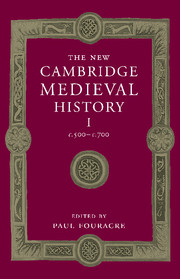Book contents
- Frontmatter
- Introduction: the history of Europe 500–700
- 1 The later Roman Empire
- 2 The Barbarian invasions
- 3 The sources and their interpretation
- PART I THE SIXTH CENTURY
- PART II THE SEVENTH CENTURY
- PART III THEMES AND PROBLEMS
- List of Primary sources
- Bibliography of secondary works arranged by chapter
- Index
- Frontispiece"
- Plate section"
- Map 3 Gaul/Francia in the sixth and seventh centuries"
- References
2 - The Barbarian invasions
Published online by Cambridge University Press: 28 March 2008
- Frontmatter
- Introduction: the history of Europe 500–700
- 1 The later Roman Empire
- 2 The Barbarian invasions
- 3 The sources and their interpretation
- PART I THE SIXTH CENTURY
- PART II THE SEVENTH CENTURY
- PART III THEMES AND PROBLEMS
- List of Primary sources
- Bibliography of secondary works arranged by chapter
- Index
- Frontispiece"
- Plate section"
- Map 3 Gaul/Francia in the sixth and seventh centuries"
- References
Summary
histiriography
The so-called ‘barbarian invasions’ have a vital role in, and in many respects stand at the beginning of, European history. Almost all national histories in some way or other go back to a group of invading or migrating barbarians: Anglo-Saxons in England, Goths and Lombards in Italy, Franks and Burgundians in France, Visigoths in Spain, or Scots in Scotland. The popularly perceived founders of the national histories of many western countries are those early medieval writers who are deemed to have offered ‘national’, ‘ethnic’ histories of these migrating peoples: Bede in England, who wrote an Ecclesiastical History of the English People in the 730s, Paul the Deacon in Italy, who wrote his History of the Lombards in the 780s, and Isidore of Seville, whose History of the Goths, Sueves and Vandals was written in Spain in the early seventh century. Gregory of Tours, author of Ten Books of Histories of his own times (the late sixth century), is classed as having written a History of the Franks. Although that was in fact the name given to an anonymous seventh-century six-book abbreviation of Gregory’s work including only the material to do with Franks, it has nevertheless earned him the title of ‘Father of the History of France’.
Most western national consciousness can thus be traced back to notions, however confused, of barbarian invasions or migrations. They are held to have swept away the ancient ‘classical’ world, the world of Rome, and to have introduced the Dark Ages. This was not always seen as a disaster; far from it, German and English historians in particular have been fond of picturing the barbarians as sweeping away a tired, effete and decadent Mediterranean civilisation and replacing it with a more virile, martial, Nordic one.
Keywords
- Type
- Chapter
- Information
- The New Cambridge Medieval History , pp. 35 - 55Publisher: Cambridge University PressPrint publication year: 2005
References
- 5
- Cited by

